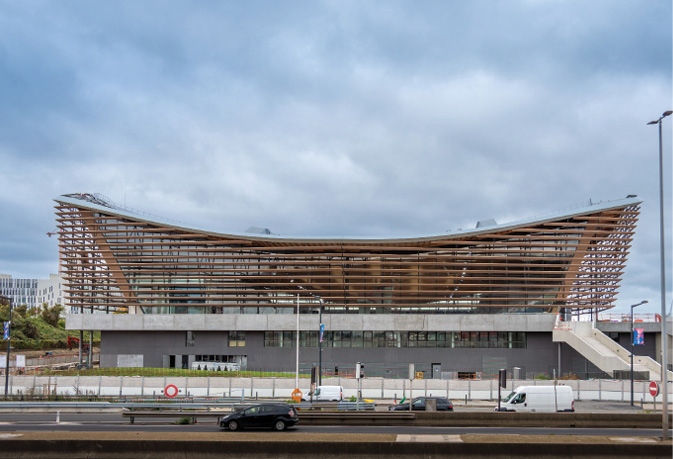
By the time this edition of Glass Magazine hits readers, the Paris 2024 Olympics will be underway, and I will be among the millions of viewers worldwide who will suddenly become an armchair expert in everything from pommel horse to archery. Paris’ successful bid to host the games was centered on its ability to produce a more sustainable event, with commitments to run the games on 100% renewable energy; minimize plastics; and reduce, rent or reuse materials and resources, including venues for sporting events.
Ninety-five percent of the Paris 2024 competition venues will occur at existing or temporary structures. However, the games will feature one permanent centerpiece—The Paris Olympics Aquatics Centre, a striking example of new sustainable construction, complete with a sweeping timber structure and glass façade.
The Aquatics Centre, the result of a collaboration between Dutch firm VenhoevenCS and France’s Ateliers 2/3/4, will host diving, synchronized swimming and water polo events during the Olympics.
The building features a solar array on the roof, which will generate 20% of all required electricity for the building. The 4,680-square-meter array is one of France’s largest urban solar farms.
Additionally, the center consists of a wood structure and roof, a design responding to a proposed French sustainability law that requires new public construction to feature at least 50% wood or other biomaterials. According to officials from façade engineer Schlaich Bergermann Partner, the building is supported by the largest concave timber frame in the world, which spans 90 meters and features more than 2,700 square meters of wood. Slatted wood beams surround the building’s glass façade.
Additionally, the Olympic Village will be an “eco-quarter,” per organizers. All structures will rely on renewable energy, and many will be temporary. All buildings under eight floors will be made from wood and glass. One third will feature solar panels and another third will have green roofs to reduce temperatures inside of the building. Of the housing accommodations being constructed for the games, more than a third will be set aside for public housing following the Olympics.
Of course, sustainable building successes are not limited to Paris. In this issue of Glass Magazine, we feature the 2024 Glass Magazine Award winners, including Georgia’s first building to receive the Living Building Challenge certification. The awards also include a striking oval tower that appears as a single piece of glass, a museum with an energy-efficient glass façade that echoes a vision of a draping veil, and many more impressive glass and glazing achievements.

